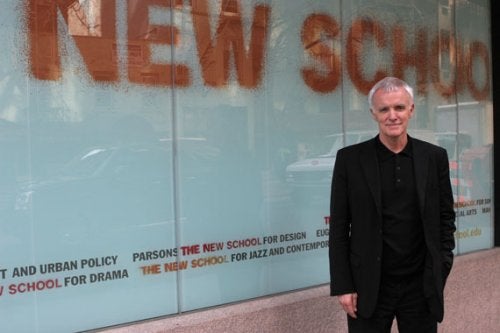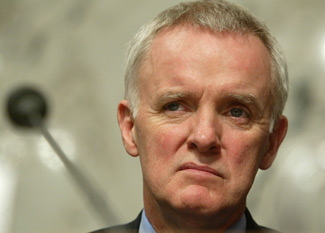 When former Sen.Bob Kerrey was tapped last week to replace current MPAA chief Dan Glickman, one of the selling points was his stint running prominent research university the New School.
When former Sen.Bob Kerrey was tapped last week to replace current MPAA chief Dan Glickman, one of the selling points was his stint running prominent research university the New School.
Turns out his resumé isn't one you'd exactly want to bring home to mother.
During his nine-year tenure, Kerrey's propensity to fire provosts and his often abrasive management style resulted in a vote of "no confidence" on the part of the faculty and brought about an occupation of the cafeteria by students.
Even admirers of the former senator from Nebraska, decorated war veteran and one-time Democratic presidential hopeful admit that that his volatile leadership of the New School call into question whether he has the temperament to play a key role in the entertainment industry at a time when the movie business is undergoing a wide array of threats, involving everything from online piracy to a cratering DVD market.
TheWrap broke the story on Friday that Kerrey would be Hollywood's top lobbyist, and with studio chiefs signing off on his appointment, the job is his to lose. A deal is expected this week with an announcement expected shortly thereafter.
"I don't want to say anything that might mess up his chances of a new job. I'm desperate to get rid of him," Andrew Arato, professor of political and social theory at the New School, told TheWrap. "Not everything bad that happened while he was here can be blamed on him, but a lot of it bears his fingerprints."
Faculty members such as Arato complain that Kerrey has been aloof and autocratic during his time at the university. He has gone through five provosts, often dismissing them unceremoniously over managerial differences. 
"Given his career, you would think Kerrey would have a political persona, but he has a military persona and he's proud of that," Arato said. "He's hierarchical, not collegial. I've seen him remove deans and provosts without any real process or deliberation. I mean, these are distinguished men."
"The big riddle is, How could someone who was such an outstanding politician provoke such opposition in a university setting?" Jim Miller, professor of political science at the New School, told TheWrap.
However, Miller added, "Many of the traits that served him well as governor and senator — and could serve him well out in Hollywood, particularly a tendency to unguardedly say what's on his mind — caused a culture clash."
And to be sure, Kerrey's boosters have pointed to his ambitious plans for the New School's campus and his skills at fundraising.
Kerrey doubled the number of full-time faculty to 351 over his first eight years and saw the number of undergraduates swell to more than 6,000. Despite the recession, the endowment now stands at $214 million, down slightly from 2008, but up substantially from the $179 million it had banked at the close of 2006.
The New School is adhering to a strict "no comment" policy regarding Kerrey, who gave notice at the school in May 2009, and whose contract expires next month.
His problems at New School began almost immediately up on his arrival there in 2001.
A few months after taking office, the New York Times and "60 Minutes II" broke reports that while in Vietnam Kerrey led a swift-boat raid on the peasant village of Thanh Phong that resulted in the deaths of several women and children.
Accounts vary, with Kerrey claiming that he thought initially he was targeting only Viet Cong — but even he admits that civilians died needlessly because of his actions.
New School faculty considered a vote of "no confidence," but relented when Kerrey promised to focus on human rights work and make war crimes a deeper focus within the school's curriculum.
He also engaged in a series of meetings with students and faculty in which he tried to answer questions surrounding the incident and to explain his actions –a move that drew mixed reviews.
"He sat on stage alone, and students and faculty lined up at microphones in the aisle to ask him the same question, namely: 'How can an alleged war criminal represent a pacifist institution?'" remembers Tim Johnston, a freshman at the time. "No one really seemed to consider that there isn't a good answer to that question. There wasn’t a lot of introspection from the students and faculty, and Kerrey was not very good at speaking to them, either."
Kerrey tried to stamp out that issue early, but it has continued to simmer throughout his time at the liberal school — exacerbated by his early support for the Iraq War.
That position once again put him in opposition to the political views held by the majority of people on campus. It was telling that at the height of campus protests in 2008 and 2009, many students frequently chanted that he was a war criminal whenever he would appear in public, Kevin Dugan, the senior news editor of the school's paper at the time, told TheWrap.
Even some of his best-laid plans went awry.
When he took the helm, the New School's physical plan was a kaleidoscopic mass, lacking any campus core. Kerrey has worked aggressively to combat this, building new design and welcome centers that have drawn praise and awards.
But even parts of that vision has been at loggerheads with the New School community. A move to tear down one of the school's signature buildings at 65 Fifth Ave. provoked fierce opposition.
In 2009, nearly 20 students occupied the building and, in a controversial decision, Kerrey called in the New York riot police, who arrested all of the students and three more who were protesting outside.
It was not the first occupation to take place during Kerrey's presidency.
In 2008, hundreds of students took over the student cafeteria calling for Kerrey's resignation. Outside the building they linked arms and stopped traffic, while inside student leaders engaged in protracted negotiations to, among other things, create a committee to ensure the school engaged in socially responsible investing. Their decision to barricade themselves in opposition drew national headlines and resulted in a 30-hour standoff with the police.
That same year, in protest to Kerrey's managerial style and jettisoning of popular provost Joseph Westphal, over 90 percent of the New School's faculty took a vote of "no confidence" in Kerrey's leadership — and this time did not relent. Kerrey, however, was able to keep control, helped in part by his deep ties to the university's board of trustees and his decision to make certain concessions.
Among others things, he agreed to give both students and faculty a greater say in school governance, consented to the appointment of a faculty-favored provost, and generally agreed to be less dictatorial in his leadership methods.
"It was a chaotic time," Dugan told TheWrap. "Kerrey tried to do some student outreach, but he was seen as a politician, and nobody bought what he said."
But even Miller, who clashed publicly with Kerrey president sees things about Kerrey to admire.
"He put the school on the map," Miller said. "If you know higher education, presidents tend to be bland, uninteresting and dull. They tend to be mannequins. He always said what he thinks."
"If you were to take the New School on the day before Kerrey got there as president to the day he leaves and break that down in terms of numbers, you're going to see net increases in profit, increases in enrollment and grades, and you'll see a lot of bottom line improvements to the institution," Dugan said.
"The problem was that in order to do that he had to change the culture of the school, and that didn't sit well."





